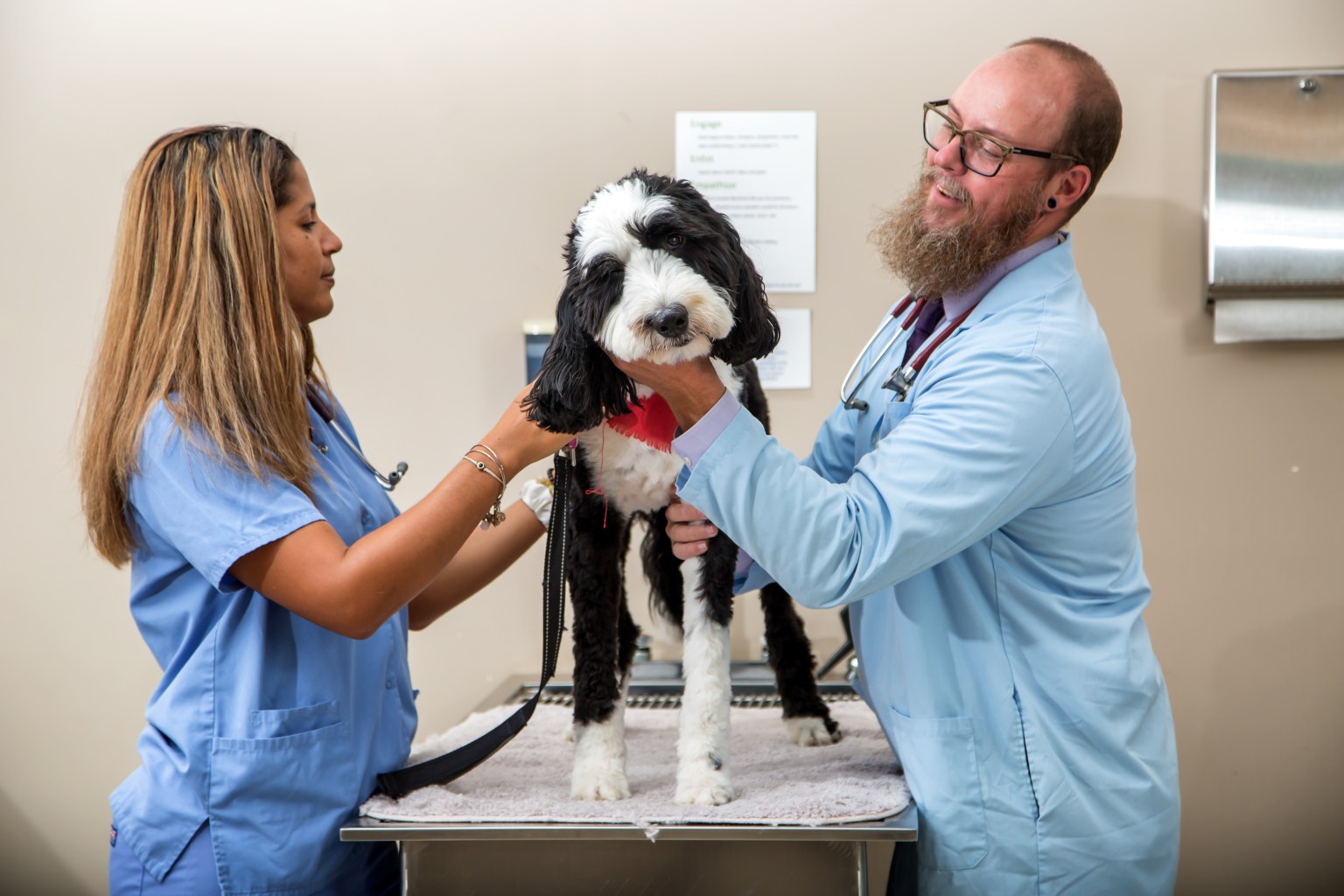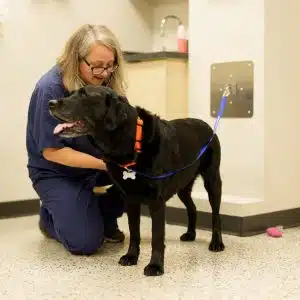Benefits of choosing Veterinary Oncology Services for your pet
Comprehensive Guide to the Solutions Used by a Vet Oncologist
Vet oncology encompasses a large variety of solutions focused on detecting and dealing with cancer cells in pets. Veterinary Oncology Services. Oncologists employ sophisticated diagnostic methods and use numerous therapy alternatives customized to every animal's demands. They additionally prioritize helpful treatment and provide important resources for pet dog owners. Understanding these services is vital for making informed decisions. What certain facets of vet oncology can significantly impact a family pet's therapy trip?
Comprehending Vet Oncology
Veterinary oncology is a customized field concentrated on diagnosing and treating cancer in animals. This technique includes a wide variety of strategies, from clinical therapies such as chemotherapy and immunotherapy to surgical interventions aimed at removing tumors. Veterinary oncologists are educated to acknowledge the unique manifestations of cancer cells in various types, allowing them to customize treatment strategies to individual clients.
Along with standard therapies, vet oncology highlights encouraging care, which plays a crucial role in enhancing the quality of life for damaged animals. This includes pain administration, nutritional assistance, and palliative care alternatives. Collaboration with pet dog owners is important, as they are integral to decision-making concerning their animals' therapy paths. As research breakthroughs, veterinary oncology proceeds to evolve, offering new hope and improved results for family pets diagnosed with cancer. Generally, this area is basic for dealing with the intricacies of cancer cells in companion animals.
Advanced Diagnostic Techniques
Advanced diagnostic methods play a necessary function in vet oncology, providing critical understandings into the existence and degree of cancer in pets. Imaging methods such as ultrasound, CT scans, and MRI are typically employed to picture lumps and evaluate their features. Furthermore, biopsy procedures are necessary for obtaining tissue examples, allowing for clear-cut medical diagnosis and customized therapy plans.
Imaging Modalities Utilized
Imaging methods play an essential function in the diagnosis and monitoring of cancer in pets. Veterinary oncologists make use of numerous advanced imaging methods to assess growth metastasis, presence, and size. Radiography, or X-rays, uses a preliminary sight of bone and chest conditions, while ultrasound supplies real-time imaging of soft tissues, permitting thorough assessment of inner organs. Calculated tomography (CT) enhances visualization of complicated physiological structures and enables 3D repairs, aiding in specific lump localization. Magnetic resonance imaging (MRI) is very useful for soft cells distinction, specifically in mind lumps. Furthermore, nuclear medicine strategies such as positron discharge tomography (PET) assistance determine metabolic task within growths. Jointly, these modalities enhance diagnostic accuracy, leading effective treatment approaches for oncological clients.
Biopsy Procedures Explained
Complying with the initial evaluation with imaging modalities, obtaining a definitive diagnosis frequently requires cells sampling through biopsy procedures. Veterinary oncologists use numerous biopsy methods based on the lump's area and features. Fine needle ambition (FNA) is a minimally invasive method that extracts cells for cytological assessment, ideal for shallow masses. Core needle biopsies give bigger tissue samples and work for deeper tumors, enabling histopathological analysis. Surgical biopsies include excising a section or the whole tumor, assisting in extensive evaluation. These procedures not only verify the existence of cancer cells but also assist determine its kind and quality, directing treatment choices. Each biopsy strategy is picked thoroughly to stabilize diagnostic precision with individual security and convenience.
Therapy Options for Cancer Cells in Pets
When a family pet is identified with cancer, a variety of therapy options appear to aid boost and take care of the illness lifestyle. Veterinary oncologists typically suggest a multidisciplinary method customized to the specific pet's requirements, which may consist of surgery, radiation therapy, immunotherapy, or different therapies.
Surgical treatment is usually employed to eliminate lumps and affected tissues, potentially bring about complete remission in some cases. Radiation treatment intends to target and destroy cancer cells, minimizing lump size and minimizing signs - Veterinary Oncology Services. Immunotherapy utilizes the family pet's body immune system to fight cancer much more properly, while alternative treatments might consist of acupuncture or organic supplements to support general wellness
Each treatment option lugs its own benefits and dangers, and veterinary oncologists function closely with pet owners to make a thorough plan that aligns with the animal's specific diagnosis and the owner's desires. The supreme goal is to enhance the pet dog's convenience and high quality of life throughout their cancer trip.
Radiation treatment for Animals
Radiation treatment is a typical therapy alternative for pets identified with cancer and is commonly utilized along with other therapies outlined by vet oncologists. This treatment entails the management of specific medicines created to target and destroy cancer cells, thus reducing tumor dimension and stopping the spread of the disease. Veterinary oncologists tailor radiation treatment procedures based upon the kind of cancer cells, the pet dog's total wellness, and the desired treatment result.
Adverse effects can occur, as these medications might likewise influence healthy cells. Usual reactions consist of nausea or vomiting, throwing up, and short-lived changes in hunger - Veterinary Cancer Specialist. Veterinary oncologists are geared up to handle these adverse effects properly, guaranteeing the family pet's comfort throughout the treatment procedure. Normal surveillance via blood examinations and follow-up consultations is necessary to evaluate the pet dog's feedback to chemotherapy and make necessary modifications. Ultimately, radiation treatment can offer substantial advantages, improving the high quality of life for family pets dealing with cancer cells diagnoses

Radiation Therapy in Veterinary Medicine
Radiation therapy functions as an efficient therapy option for pet dogs identified with local tumors, providing a targeted approach to cancer cells administration. This technique makes use of high-energy radiation to damage the DNA of cancer cells, hindering their capacity to proliferate. It is specifically advantageous for lumps that are not open to surgical elimination or for situations where surgery might not be viable as a result of the lump's location.
Veterinary oncologists customize radiation procedures based on growth size, kind, and area, in addition to the animal's total wellness. Therapy can be supplied using outside light beam radiation or brachytherapy, each with distinctive advantages. Typically, numerous sessions are required to optimize effectiveness while lessening side impacts.
Pets might experience short-lived responses such as skin inflammation, the overall aim is to shrink lumps and reduce symptoms, ultimately enhancing the pet's diagnosis and top quality of life. Appropriately, radiation treatment plays an important role in thorough cancer care.
Palliative Treatment and Lifestyle
Palliative treatment in vet oncology concentrates on improving the top quality of life for pets facing terminal health problems, making sure comfort and dignity in their final days. This specialized method prioritizes discomfort administration, symptom control, and emotional support. Veterinary oncologists examine each family pet's private requirements, customizing interventions to relieve discomfort and enhance general well-being.
Techniques may include providing medications for pain alleviation, taking care of queasiness, and addressing other upsetting symptoms. In addition, dietary assistance is often offered to preserve stamina and improve hunger. The emotional element of palliative care is similarly vital; producing a tranquil atmosphere helps in reducing stress and anxiety for both animal and owner.
Inevitably, the objective of palliative care is to permit family pets to appreciate their continuing to be time with as much happiness and self-respect as feasible. By concentrating on comfort and lifestyle, vet oncologists play an important function in ensuring that animals and their family members navigate this difficult trip with concern and understanding.
Assistance for Family Pet Owners During Therapy

Psychological Support for Owners
Charting the psychological landscape throughout an animal's cancer therapy can be an overwhelming experience for proprietors. The uncertainty surrounding diagnosis and diagnosis can cause feelings of vulnerability, despair, and stress and anxiety. Vet oncologists recognize the value of psychological assistance and often provide support to aid proprietors navigate this challenging trip. Communication is important; reviewing therapy choices and potential outcomes can reduce some worries. Furthermore, supplying reassurance that emotional actions are legitimate fosters a helpful atmosphere. Lots of oncology clinics might likewise suggest support system or counseling services customized for pet dog owners, assisting in common experiences. find out this here Motivating owners to focus on self-care throughout this time is crucial, as their psychological wellness straight affects their pet's convenience and overall therapy experience.

Resources and Educational Products
Guiding via the intricacies of an animal's cancer treatment can be intimidating for proprietors, making accessibility to trusted sources and educational materials essential. Vet oncologists usually provide a variety of handouts, sales brochures, and online products that explain treatment options, potential side results, and care approaches. These resources help empower and debunk the process pet proprietors to make educated decisions. Additionally, numerous oncology facilities supply access to sustain online forums and groups where explanation owners can attach with others encountering comparable difficulties, fostering a feeling of neighborhood. Educational workshops and webinars performed by veterinary experts even more boost understanding, making sure that owners are fully equipped to navigate their family pet's journey through cancer cells treatment with confidence and expertise.
Regularly Asked Inquiries
Exactly How Can I Prepare My Pet Dog for a Veterinary Oncology Go To?
Preparing an animal for a vet oncology check out entails event medical records, keeping in mind symptoms, and making certain the family pet is comfy. A tranquil attitude and acquainted products can aid alleviate anxiety during the appointment.
What Are the Indicators My Animal May Have Cancer?
Indications that a pet dog may have cancer cells include unexplained weight management, persistent vomiting or diarrhea, unusual lumps or swellings, sleepiness, adjustments in hunger, difficulty breathing, and changes in behavior. Motivate vet attention is important.
Just How Can I Assistance My Animal Emotionally Throughout Treatment?
Supporting a pet dog emotionally throughout treatment entails providing comfort, keeping regimens, providing mild love, and making sure a tranquil Source atmosphere. Participating in quiet play and regular companionship assists minimize anxiety and promotes a complacency.
Exist Alternate Therapies for Pet Dogs With Cancer cells?
Different therapies for pets with cancer cells consist of acupuncture, organic treatments, and dietary support. These techniques may match standard treatments, promoting total wellness. Consulting with a vet is crucial for secure and effective integration of alternate therapies.
What Expenses Should I Expect for Vet Oncology Providers?
The anticipated expenses for veterinary oncology solutions can vary substantially, frequently affected by diagnostics, treatments, and recurring care. Family pet proprietors should plan for expenses varying from consultations to specialized treatments, showing the intricacy of cancer management.
Partnership with pet dog owners is vital, as they are indispensable to decision-making regarding their family pets' treatment paths. Each therapy option carries its very own advantages and dangers, and veterinary oncologists work closely with pet dog proprietors to make a comprehensive strategy that lines up with the family pet's certain medical diagnosis and the owner's dreams. Pet dogs may experience momentary responses such as skin irritation, the overall objective is to shrink lumps and ease signs, ultimately enhancing the family pet's diagnosis and top quality of life. Assistance for pet dog owners during treatment is important in steering with the emotional difficulties connected with a pet's cancer medical diagnosis. Preparing a pet dog for a veterinary oncology see entails celebration medical records, noting signs and symptoms, and making sure the family pet is comfy.